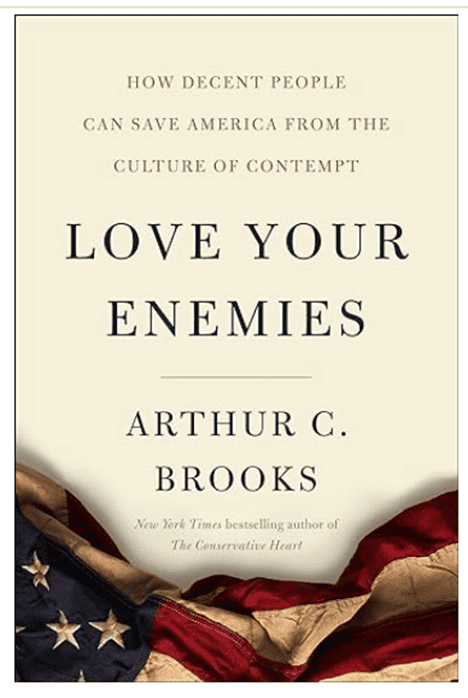By Jim Heffernan
I bought this book last April and I’m not sure why I did not review it at the time. The author is a devout Catholic with serious conservative and Republican credentials, all things I am not. It’s a surprise to me how much I enjoyed the book and how I found nothing in the book to argue with. I’m sure I will be reading more of his books.
The book is divided into eight chapters and a masterful conclusion. Each seems like they could have been a magazine article, yet they each very successfully carry the theme of saving America from a “Culture of Contempt.” This has been a very important book to me and I’d like to talk about each chapter.
Chapter 1 “Culture of Contempt” – Explores unfamiliar term, “motive attribution asymmetry” and how it makes us eager to erroneously assign blame.
Chapter 2 “Can You Afford to be Nice?” – We overly value winning, but niceness is best, Nelson Mandela and Martin Luther King are prime examples
Chapter 3 “Love Lessons for Leaders” – Contrasts coercive leaders and authoritative leaders, draws heavily on author’s decade spent as Frenchhorn player in Barcelona Philharmonic Orchestras
Chapter 4 “How Can I Love My Enemies If They Are Immoral?” – Contains a great quote from David Brooks (no relation): “Morality was once revealed, inherited and shared, but now it’s thought of as something that emerges in the privacy of your own heart.” Draws 3 major lessons: 1. Focus your arguments on the moral values we share—compassion and fairness—rather than those held only by one part of the population. 2. Be wary of manipulative leaders in politics and media who use moral dimensions where we disagree as a wedge to divide us and fuel contempt. 3. “Divergent moral values are not a bug in the human system. They are a feature that can make us stronger.”
Chapter 5 “The Power and Peril of Identity” – Urges us to bridge with others irrespective of identity, embracing diversity and shunning “identity politics”.
Chapter 6 “Tell Me a Story” – Explores how telling stories is far more effective than piling on more data.
Chapter 7 “Is Competition Our Problem” – Decries sentiment to bann dodge ball in favor of self-esteem and praises the benefits of competion.?
Chapter 8 “Please Disagree with Me” – Cornell West’s and Robby George’s (radically different philosophers) joint statement and the 4 rules that flow out of it might perfectly encapsulate the book.
“None of us is infallible. Whether you are a person of the left, the right, or the center, there are reasonable people of goodwill who do not share your fundamental convictions. All of us should be willing—even eager—to engage with anyone who is prepared to do business in the currency of truth-seeking discourse by offering reasons, marshalling evidence, and making arguments. The more important the subject under discussion, the more willing we should be to listen and engage—especially if the person with whom we are in conversation will challenge our deeply held—even our most cherished and identity-forming beliefs.
Our willingness to listen to and respectfully engage those with whom we disagree (especially about matters of profound importance) contributes vitally to the maintenance of a milieu in which people feel free to speak their minds, consider unpopular positions, and explore lines of argument that may undercut established ways of thinking. Such an ethos protects us against dogmatism and groupthink, both of which are toxic to the health of academic communities and to the functioning of democracies.”
Rule 1 Find your Robby, Cornel, or Frank (hypothetical friend you can disagree with and not jeopardize friendship)
Rule 2 Don’t attack or insult. Don’t even try to win.
Rule 3 Never assume the motives of another person.
Rule 4 Use your values as a gift, not as a weapon.
Conclusion “Five Rules to Subvert the Culture of Contempt”. These rules are the treasures of the book.
Rule 1. Stand up to the Man., Refuse to be used by the powerful.
Rule 2. Escape the bubble. Go where you’re not invited and say things people don’t expect.
Rule 3. Say no to contempt. Treat others with love and respect, even when it’s difficult.
Rule 4. Disagree better. Be part of a healthy competition of ideas.
Rule 5. Tune out: Disconnect from unproductive debates.
The author is a very interesting man who was born in 1964 and grew up in Seattle. He dropped out of college in his early 20’s and became a professional musician for a decade and then went back to college. By 1998 he had a master’s degree and PH.D in public policy. From 2009 to 2019, Brooks served as the 11th President of the American Enterprise Institute (AEI). His “Leadership and Happiness” class at Harvard Business School is very popular.
Published March 12, 2019 261 Pages Available at Cloud and Leaf Bookstore, Manzanita and Tillamook Public Library
As always, discussion is welcome at codger817@gmail.com


